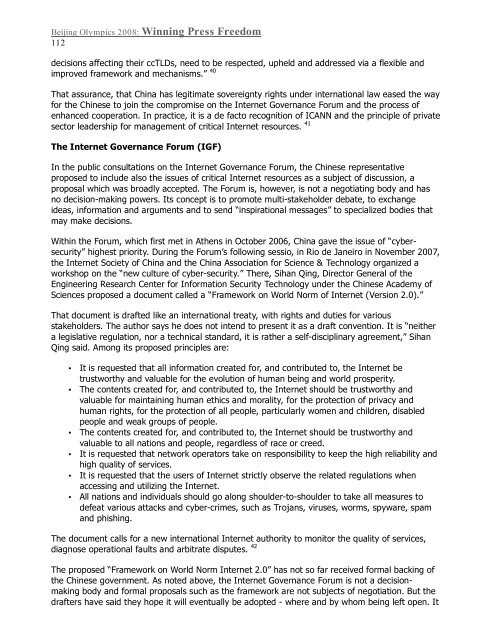Beijing Olympics 2008: Winning Press Freedom - World Press ...
Beijing Olympics 2008: Winning Press Freedom - World Press ...
Beijing Olympics 2008: Winning Press Freedom - World Press ...
You also want an ePaper? Increase the reach of your titles
YUMPU automatically turns print PDFs into web optimized ePapers that Google loves.
<strong>Beijing</strong> <strong>Olympics</strong> <strong>2008</strong>: <strong>Winning</strong> <strong>Press</strong> <strong>Freedom</strong><br />
112<br />
decisions affecting their ccTLDs, need to be respected, upheld and addressed via a flexible and<br />
improved framework and mechanisms.” 40<br />
That assurance, that China has legitimate sovereignty rights under international law eased the way<br />
for the Chinese to join the compromise on the Internet Governance Forum and the process of<br />
enhanced cooperation. In practice, it is a de facto recognition of ICANN and the principle of private<br />
sector leadership for management of critical Internet resources. 41<br />
The Internet Governance Forum (IGF)<br />
In the public consultations on the Internet Governance Forum, the Chinese representative<br />
proposed to include also the issues of critical Internet resources as a subject of discussion, a<br />
proposal which was broadly accepted. The Forum is, however, is not a negotiating body and has<br />
no decision-making powers. Its concept is to promote multi-stakeholder debate, to exchange<br />
ideas, information and arguments and to send “inspirational messages” to specialized bodies that<br />
may make decisions.<br />
Within the Forum, which first met in Athens in October 2006, China gave the issue of “cybersecurity”<br />
highest priority. During the Forum’s following sessio, in Rio de Janeiro in November 2007,<br />
the Internet Society of China and the China Association for Science & Technology organized a<br />
workshop on the “new culture of cyber-security.” There, Sihan Qing, Director General of the<br />
Engineering Research Center for Information Security Technology under the Chinese Academy of<br />
Sciences proposed a document called a “Framework on <strong>World</strong> Norm of Internet (Version 2.0).”<br />
That document is drafted like an international treaty, with rights and duties for various<br />
stakeholders. The author says he does not intend to present it as a draft convention. It is “neither<br />
a legislative regulation, nor a technical standard, it is rather a self-disciplinary agreement,” Sihan<br />
Qing said. Among its proposed principles are:<br />
• It is requested that all information created for, and contributed to, the Internet be<br />
trustworthy and valuable for the evolution of human being and world prosperity.<br />
• The contents created for, and contributed to, the Internet should be trustworthy and<br />
valuable for maintaining human ethics and morality, for the protection of privacy and<br />
human rights, for the protection of all people, particularly women and children, disabled<br />
people and weak groups of people.<br />
• The contents created for, and contributed to, the Internet should be trustworthy and<br />
valuable to all nations and people, regardless of race or creed.<br />
• It is requested that network operators take on responsibility to keep the high reliability and<br />
high quality of services.<br />
• It is requested that the users of Internet strictly observe the related regulations when<br />
accessing and utilizing the Internet.<br />
• All nations and individuals should go along shoulder-to-shoulder to take all measures to<br />
defeat various attacks and cyber-crimes, such as Trojans, viruses, worms, spyware, spam<br />
and phishing.<br />
The document calls for a new international Internet authority to monitor the quality of services,<br />
diagnose operational faults and arbitrate disputes. 42<br />
The proposed “Framework on <strong>World</strong> Norm Internet 2.0” has not so far received formal backing of<br />
the Chinese government. As noted above, the Internet Governance Forum is not a decisionmaking<br />
body and formal proposals such as the framework are not subjects of negotiation. But the<br />
drafters have said they hope it will eventually be adopted - where and by whom being left open. It





